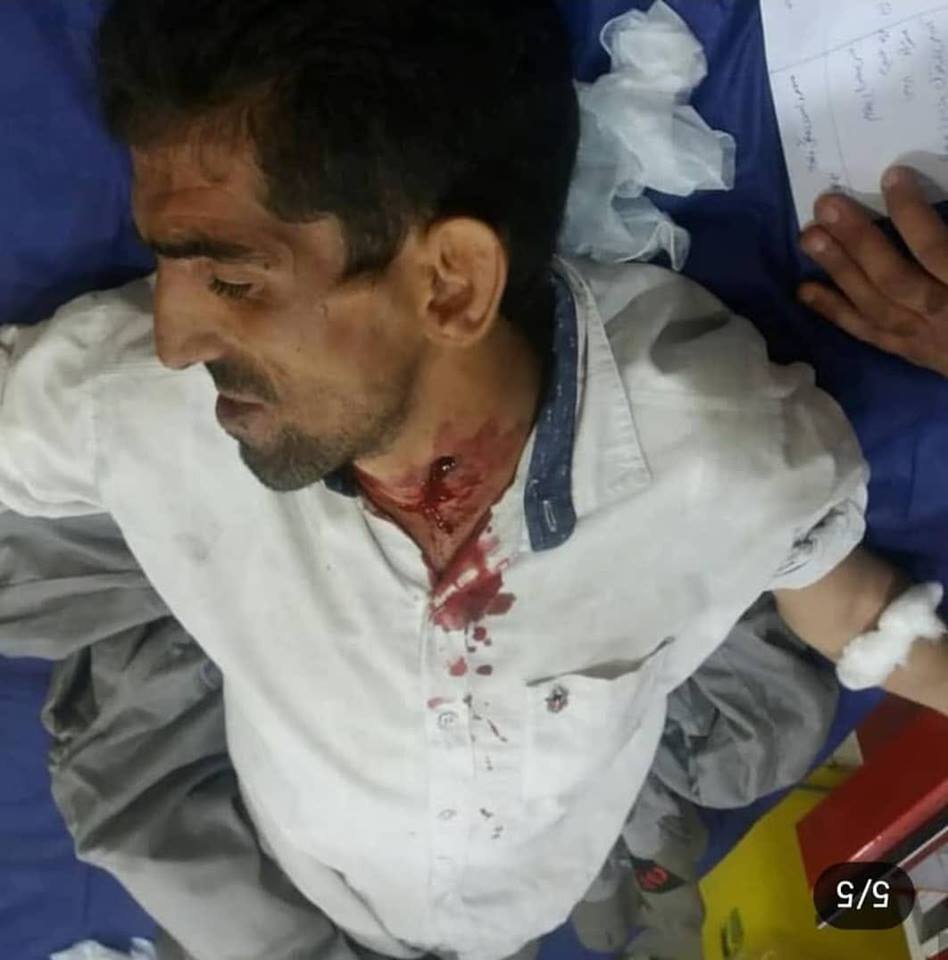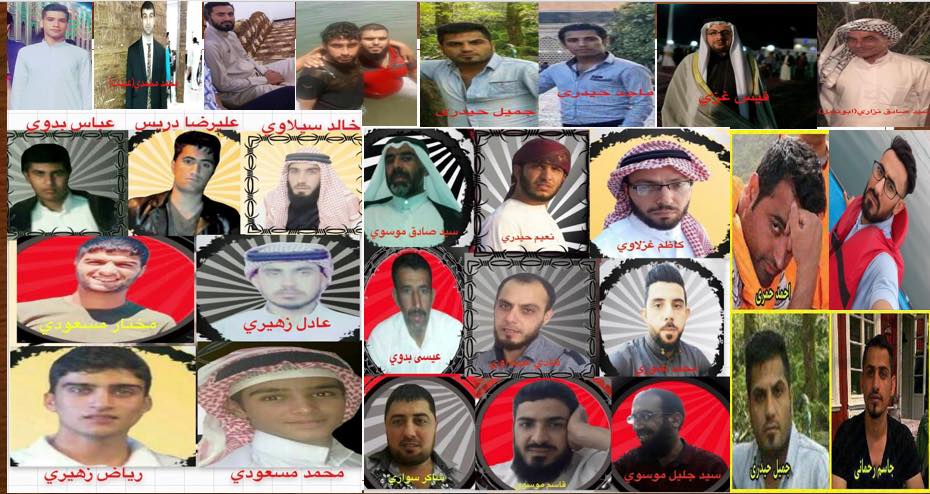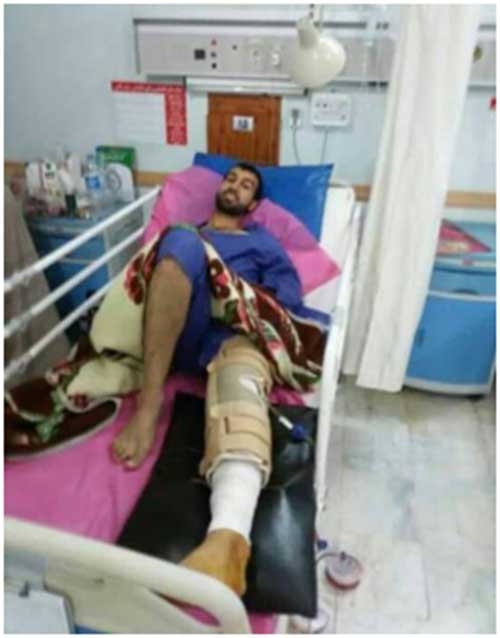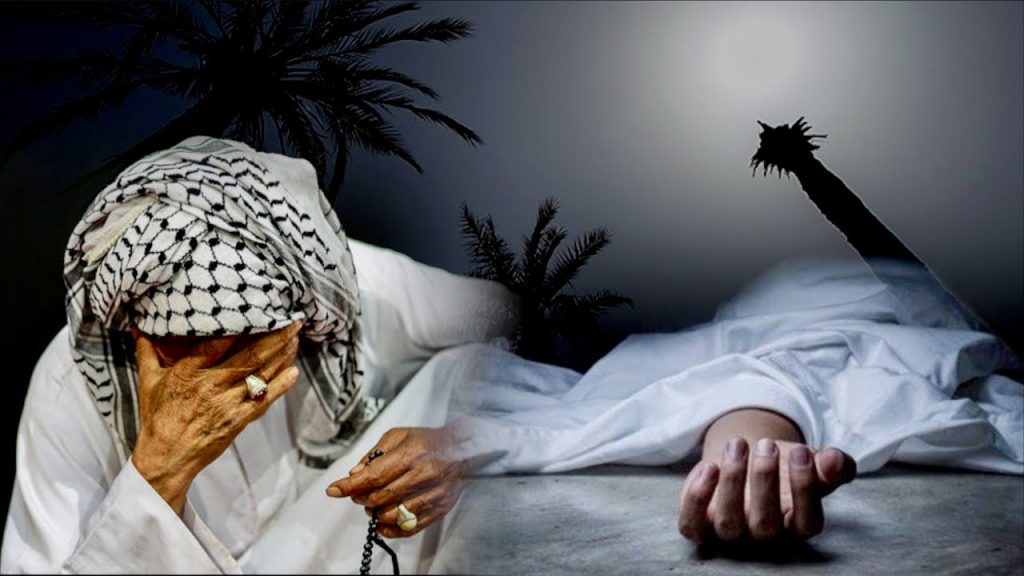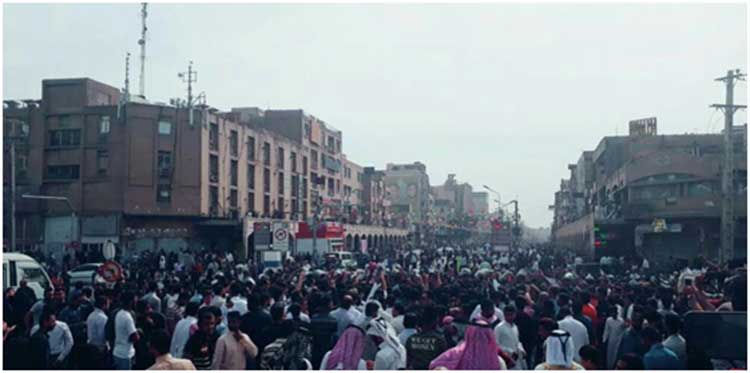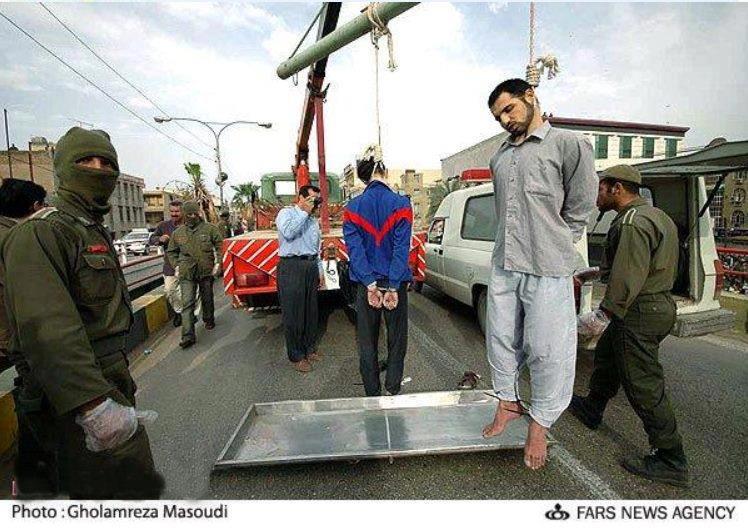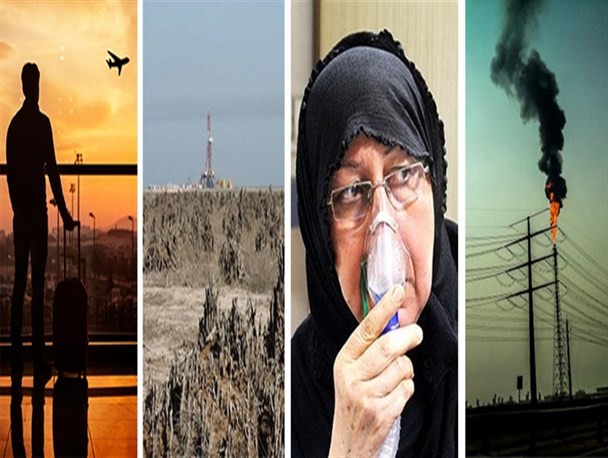
Young unemployed people of Ahwaz have protested against widespread poverty and disenfranchisement during President Hassan Rouhani’s recent visit to oil facilities in Howeyzeh, west of Ahwaz, on 13th November. The demonstrators, who came from the neighboring villages around the giant oil facilities, held up banners with slogans denouncing the heinous practices of confiscation of agricultural lands for the benefit of the Iran regime’s oil projects, as well as slogans against the racial discrimination to Ahwazi Arabs exercised by state officials in recruiting workers in oil companies.
Protesters are particularly concerned with the way in which, despite they are being located in an oil rich region, Ahwazi Arabs continue not to benefit from this and raised placards reading “our resentment is over the limit” and “why our only share of the oil wealth is smoke, toxic gases, and unemployment”. As is now well known, there have been outbreaks of disease as a result of environmental pollution caused by oil installations and rising unemployment, which has now reached record numbers.
Qassem al-Saadi, the Ahwazi MP in Iran’s parliament admitted in his recent speech that, in the areas of Khafajiyeh and Howeyzeh (Maysan), the percentage of Ahwazi workers at oil installations is 10% or less, adding that there are 83 oil, service, and urban companies active in the Maysan area, but all of these companies came from outside the Ahwaz region to make money, rather than invest in, the Maysan region. Moreover, Ahwazi human rights sources have confirmed that, although around 8,250 workers are employed in the Maysan oil installations, Arab employees make up 5% or less, and they are mostly forced to work in low paid jobs as guards and janitors in the company offices.
A report of the Centre for Statistics in Maysan in July 2016 revealed that 66% of Ahwazis of working age in 2016 are unemployed. Rouhani, in his recent visit, there, opened several new projects which will allow Iran to steal more Ahwazi oil in Maysan region, where according to the regime media’s own reports, investments in this sector have now risen to $6 billion.
Maysan region contains a large stockpile of crude oil estimated by studies to be more than 83 billion barrels. This stock is distributed among several fields as Iranian regime oil companies currently produce 300 million barrels a day. In recent months, many young Ahwazi Arabs in cities such as Muhammarah and Bandar-e Mahshor have committed suicide in protest against poverty, deprivation, deteriorating living situation, and rampant corruption in the region.
In recent months, many Ahwazi workers have been subjected to work stoppages, dismissal, termination of employment, and discrimination, forcing the Ahwazi population to sink further into economic poverty and suffering (over 85% of the population currently lives below the poverty line).
Companies dominated and chaired by Iranians who are racist have fired a disproportionate number of Ahwazi workers on several occasions during the last few of months. This was in response to peaceful protests against the desperate situation facing the Ahwazi people, as detailed above. Many of the sacked workers have (illegally) not been paid their salaries, and their protests at backdated wages have gone unanswered, even though the average monthly payment of most of the sacked workers was a mere $ 290 per month.
These dismissals can therefore clearly be seen as nothing less than a ‘political purification’ of the oilfields as workplaces—or another form of ‘ethnic cleansing’ by the regime. This systemic injustice and oppression of Arab workers even takes place against Arabic-speakers trying to use their native language while at work (it is standard policy for Farsi-speaking employers and administrators to punish those who speak Arabic in the workplace).
Persian employees working for industrial companies receive a wide variety of disproportionate benefits and support from the government, and this enforces the increasing marginalization of the Arab people, establishing a mafia-like domination by Persians in the workplace. There is no opportunity for a union-type organization to address the issues facing the Ahwazi community, with all such bodies prohibited by law.
In clearer words, the regime mafia continues to violate the rights of the Ahwazi Arab workers, imposing barriers on them by restricting access to any civil society groups that might report the abuses, such as forcing Ahwazi workers to accept lower wages, longer hours, and ever-worsening work conditions.
The mafia family of regime has replaced Ahwazi workers with Persian workers across the board. In a pathetic attempt at appeasement, a token number of Ahwaz Arab workers are hired, but these few live in poor and marginal rural and urban areas in their home country, and are forced to accept significantly lower wages than their Persian colleagues for doing the same job, nor do they have the same labor rights or benefits.
The denial of job opportunities and the absence of a steady income due to discrimination in the private sector and state-owned businesses have driven many Ahwazi Arabs to work as street vendors. It should also be noted that making ends meet as a street vendor is near-impossible.To make matters worse, the municipal authorities frequently target the poorest of the Ahwazi vendors, who are mostly women and therefore facing double discrimination, using the excuse that the women do not have a formal license for operating as street vendors.
In recent months, the municipal authorities and security forces have brutally mistreated, arrested and confiscated the goods of Ahwazi street vendors and cut off their income, leaving them in limbo and facing destitution. A history of such measures has forced millions of Ahwazi Arabs to live as outcasts.
In this video we can see how the Iranian security forces beat and arrested Ahwazi Arab workers in Mahshor city after the Ahwazi workers protested in front of the petrochemical company because they had not received their wages for six months. A number of jobless Ahwazis were also brutalized for joining in the demonstration, demanding equal employment rights and an end to the regime’s apartheid-style racial discrimination. Regime personnel arrested and beat them before forcibly dispersing them.
Ahwazi people also face a multitude of other problems. Despite the fact that the Ahwaz region houses over 90% of Iran’s oil and gas resources, they endure levels of poverty, malnutrition, slum housing, unemployment and illiteracy comparable only with the poorest states in sub-Saharan Africa.
This video shows how sadly a poor and hungry population of Ahwazi Arabs in Falahiyeh city who are gathered in front of a bank are rushing to receive monthly cash subsidy of around $12 for a person.
To sum up, Ahwazi people have been systematically excluded from and segregated in every aspect of life; they have been neglected and isolated from mainstream society and denied access to social, economic and educational opportunities. Many of the poorest Ahwazi communities have been pushed into adopting unofficial and underground economies, and even into crime, simply to survive.
In Ahwazi urban areas, the regime, under its colonial urban planning, has constructed ethnically-segregated developed neighborhoods solely for Persian settlers in line with the deliberate policy of ethnic cleansing in Al-Ahwaz. This also leaves Ahwazi Arab populated areas neglected and resembling deprived rural villages rather than city neighborhoods, without even paved roads, public lighting or street cleaning.
Due to their Arab ethnicity, Ahwazis are denied all rights, as discussed above, brutally persecuted, subjected to outrageous racial discrimination, forced displacement, political repression and compulsory assimilation.
They are banned by law from any form of peaceful protests and from forming trade unions, political parties or establishing media outlets. With anti-Arab racism endemic in Persian culture, Persian immigrantswho are settled in Al-Ahwaz by the regime and have been granted the whole socio-economic privileges, treat Ahwazi Arabs as little more than chattels, inferior beings at best.
The ongoing international silence on human rights situation in Iran amounts to a lethal weapon empowering the hands of the Iranian regime, the constant oppressor of people in the country, particularly Ahwazi Arab people who see all their wealth being stolen while they are left in growing economic impoverishment and treated with injustice solely because of their Arab ethnicity. The plight of Ahwazi people has long been neglected by the international community, with very few exceptions. Iran has occupied the lands of these people and dominating them by committing atrocities. Their struggles should be better supported by international human rights activists to pressurise the Iranian regime to grant the demands of this long oppressed nation.
Rahim Hamid is a freelance journalist and human rights advocate based in the USA who writes about the plight of his community – the Ahwazi Arabs – and other ethnic groups in Iran.

